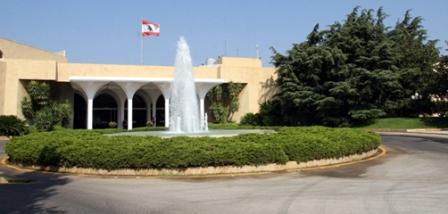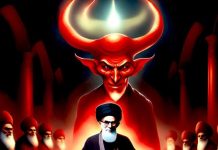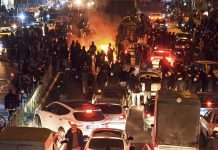We the Lebanese
Hussain Abdul-Hussain/Now Lebanon/April 11/16
After long being a pawn in regional conflicts, Lebanon’s recent troubles have been self-inflicted. Thanks to Saudi-Iranian detente in Lebanon, the country has enjoyed stability since February 2014. But because of a greedy oligarchy, incompetent leadership and a narcissistic culture, Lebanon lingers on the verge of collapse. Regional conflicts have exacted a high toll on Lebanon since its inception. The civil war ended in 1990 after the US brokered a Saudi-Syrian agreement. Syria’s Hafez al-Assad skillfully walked on the fence between Saudi Arabia and Iran, but his son Bashar threw himself on the Iranian side, pushing both Syria and Lebanon closer to the Iranian orbit. In 2003, scared of the US invasion of Iraq, both Saudi Arabia and Iran were happy to see the Americans bogged down in a quagmire. As Tehran prevailed, Riyadh switched course and decided to help Washington.
Iran perceived the Saudi switch as an aggression and responded region-wide. Countries with Sunni and Shiite populations, like Lebanon, turned into fault lines. Former Lebanese Prime Minister Rafik Hariri was killed in 2005, and a number of anti-Syrian politicians and journalists were also taken out. Lebanon’s luck, however, improved with the outbreak of the Syrian revolution in 2011, which became the outlet for regional wars. After some clashes, both Iran and Saudi decided that maintaining Lebanese stability was in their interests: The Iranians wanted Hezbollah’s command center stable to allow the party to fight in Syria; the Saudis wanted to preserve their decades-long investments in post-war Lebanon. And hence, since 2013, Lebanon has been spared the regional fire, which means that the nation’s troubles have been Lebanese-made.
Lebanon’s socio-political identity is a hybrid between Levantine and Western cultures. From their Levantine roots, the Lebanese have inherited misogyny, patriarchy, tribalism and other pre-Enlightenment social aspects. From the West, the Lebanese have imported the commercialization of women, consumerism and shallow intellectualism. The image of bikini-clad women sunbathing while puffing on their hookahs is uniquely Lebanese. Young men driving luxurious cars while holding expensive cigars, all funded by their competitively generous dads, are also uniquely Lebanese. Famous female Lebanese singers, who break almost every social taboo by hiding little flesh while on stage, carry regressive social principles. One of them said she opposes “women taking more than their rights,” and is also against “breaking the manliness of men.”Next to their amalgam of Western looks and medieval principles, the Lebanese have an awfully inadequate understanding of public space. A majority is always trying to game the system. Almost always, the Lebanese prefer to employ their connections to circumvent, not only rules, but also basic administrative procedure because standing in line like everybody else — in the Lebanese mind — is for losers and the poor.
The Lebanese have a dangerously twisted understanding of the state. To them, nationalism is the “coexistence” of sects. Each sect’s share in the bureaucracy is commensurate with its demographics, an arrangement that undermines meritocracy, encourages corruption and hinders accountability. When one sect perceives itself as being unfairly treated by not receiving its share of governmental jobs, its leaders — with support from their partisans — raise hell over what they call “the loss of their rights.”For some reason, the Lebanese just cannot see themselves as individuals with equal rights and with direct ties to the state without the oligarchs. The majority of the Lebanese have a sense of entitlement. They expect the state to do magic for them and seem unable to fathom that the state is the reflection of its people.
The Lebanese simply do not understand that the state’s resources come mainly from the taxes that very few of them pay. The Lebanese are also annoyingly whiny. They curse the state and the oligarchs, but repeatedly elect the same cast that they’ve been sending to office over the past century. The Lebanese have an outdated sense of national identity. They often fight over the historic narrative. Thus, being Lebanese hinges around Fairuz, mezza cuisine, a flag and a male-chauvinist national anthem. For some reason, the Lebanese seem unable to reorient their national identity and tie it to the future. Instead of oligarchs fighting over their “rights,” how about they deflate their egos to make way for Lebanon’s “interests,” such as growing the economy and creating jobs. Finally, a word on “alternative” movements, mainly the civil society. While these are mostly young, they offer little more than slogans. They define themselves in the negative, that is by often saying what they are not: They are not political, not sectarian, not corrupt and so on.
There is no reason for alternative movements in Lebanon to fear politics. Let them offer a new brand of politics: One that is informed and that offers a fresh perspective, independent of the oligarchs and their game. The Lebanese seem doomed, not because they live in a tough neighborhood, but because they are dangerously unaware of their shortcomings. Lebanon’s constitution needs a preamble, maybe one that begins with “We the Lebanese” and reflects a new national thinking of taking ownership of one’s destiny. If the Lebanese do not help themselves, there is little others can do for them.
**Hussain Abdul-Hussain is the Washington Bureau Chief of Kuwaiti newspaper Alrai. He tweets @hahussain




















